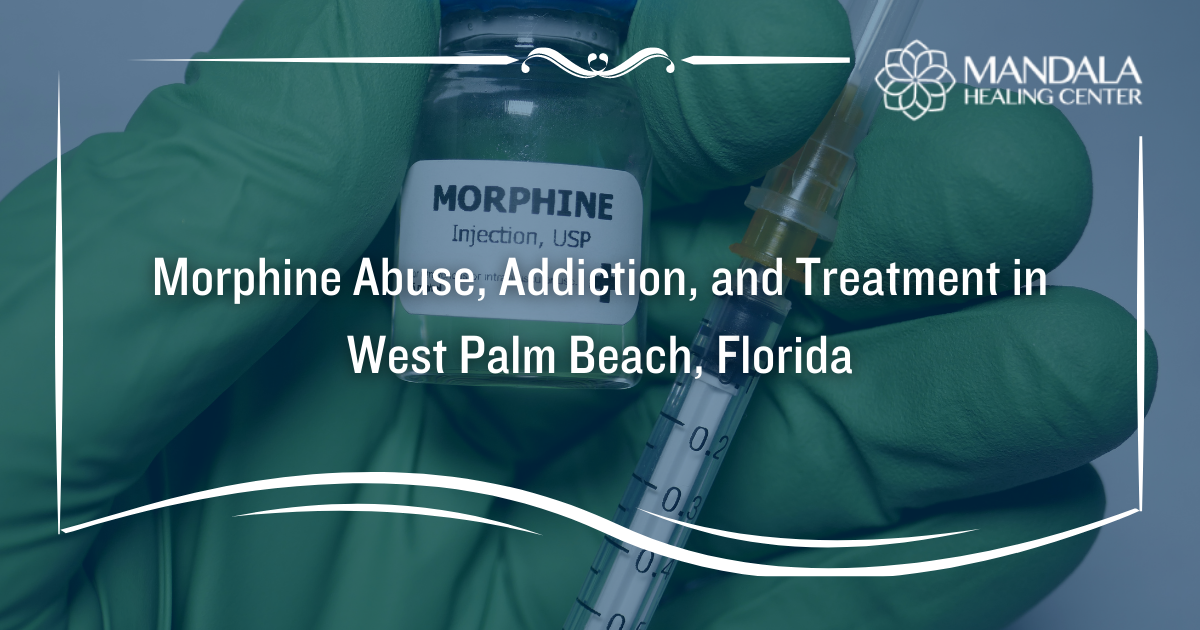Opiate abuse is a serious problem in the United States. Approximately 10% of the US population has abused an opiate drug in their lifetime. Opiate drugs, including morphine, are highly addictive and can cause severe damage to people’s health and safety.
If you use morphine and can’t stop, you must know the risks of dependence and addiction and learn how to find the comprehensive treatment you need to recover.
What is Morphine?
Morphine is an opiate drug used to relieve pain. The name morphine comes from Morpheus, the Greek god of dreams, because the drug creates a calm and euphoric feeling in users.[1] Morphine can be smoked, injected, or taken orally in pill or syrup form.
Morphine is a naturally occurring substance that is extracted from the opium poppy plant. It has a similar chemical makeup to heroin, which is derived from the same source.[2] It is also sometimes called:
- M
- Miss Emma
- Monkey
- Roxanol
- White stuff
Drug manufacturers have taken steps to prevent abuse, including coating tablets with a substance that prevents people from crushing and snorting the pills. However, many people abuse morphine and become addicted to the drug each year.
How Does Morphine Addiction Develop?
Morphine is an addictive drug. People who use morphine, even under medical supervision, develop tolerance–needing more to achieve the same effects–very quickly. In a short period, people may begin to take more morphine than prescribed or may continue to take it for longer than recommended by a healthcare professional. Many people take morphine recreationally–meaning, without a prescription–for its sedating, euphoric effects.
The pleasant, euphoric feelings people get when taking morphine can make people want to use the drug recreationally or take it differently than prescribed. People who take morphine must be cautious about following their doctor’s advice and take it only as prescribed. Those who use it recreationally must seek treatment to stop and find the support they need to avoid relapse for life.
Addiction wreaks havoc on a person’s health, safety, and relationships. It keeps people from living full, healthy lives. It’s essential to understand the risks of morphine abuse and addiction and recognize the signs of dependence so that you can find treatment as quickly as possible.
Signs of Morphine Abuse and Addiction
Without treatment, people who are addicted to morphine may face severe consequences to their physical and mental health. Morphine addiction can lead to immediate and long-term harm.Some signs of morphine abuse and addiction include:
- Needing more of the drug to get the same effects
- Taking morphine without a prescription
- Taking larger doses of morphine or taking it more often than prescribed
- Wanting to stop using morphine but being unable to
- Experiencing legal or financial trouble related to your morphine use
- Neglecting your responsibilities at home, work, or school
- Experiencing withdrawal symptoms if you stop
- Continuing to use morphine despite negative consequences
The Dangers of Morphine Abuse
Addiction prevents people from working, socializing, or caring for their basic needs. Opioid addiction makes it nearly impossible to live a healthy lifestyle or even function normally. People with untreated drug addictions often live with severe physical and mental health problems and may face life-altering legal and financial trouble related to their substance use.
Overdose is also a serious concern with morphine abuse and addiction. An overdose occurs when someone takes a large dose of a drug their body cannot tolerate.
Signs of a morphine overdose include:[3]
- Slurred speech
- Inattention
- Extreme drowsiness
- Swelling in the face or extremities
- Lack of movement
- Slow breathing
- Muscle spasms, stiffness, or pain
- Elevated blood pressure
- Extreme thirst
- Fever
Morphine slows the activity of the central nervous system (CNS). Without immediate medical intervention, people who are overdosing may lose consciousness or slip into a coma, or their breathing may become so shallow and slow that they die.
What Happens in Morphine Addiction Treatment?
Morphine addiction treatment happens in stages, beginning with an evaluation from a doctor or addiction specialist. Your treatment professional will ask you questions about your physical and mental health, drug use, and treatment history so they can recommend an appropriate level of care. Many people begin treatment in a medically-supervised detox program.
Detox
Many people experience uncomfortable withdrawal symptoms when detoxing from morphine. These symptoms can cause people to relapse early in the process. In a medically-supported detox program, medical and support staff will assess and treat your withdrawal symptoms. Treatment for opioid withdrawal often includes medications, holistic therapies, and emotional support, including individual counseling.
Treatment
After completing detox, you must work through a comprehensive treatment plan that uses evidence-based and holistic therapies to address your addiction’s emotional, physical, and behavioral aspects. Common therapies include:
- Individual counseling
- Group therapy
- Education
- Medications
- Medical and mental health treatment
- Family therapy
- Holistic therapies, including nutrition counseling, yoga, massage, and art therapy
The length of time you spend in treatment will depend on the severity of your addiction, prior treatments, mental and physical health, and other personal factors. After completing a morphine addiction treatment program, you must develop an aftercare plan to stay engaged in your recovery for the rest of your life.
Find Treatment for Morphine Abuse and Addiction Today
You do not have to live with morphine addiction. With the right treatment and support, recovery is possible. At the Mandala Healing Center, our caring and knowledgeable staff will work with you to set and reach new goals as you recover from addiction.
For more information about our supportive programs, contact our admissions staff today.
References:












